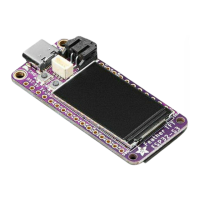Does CircuitPython support long integers, like regular
Python?
Python long integers (integers of arbitrary size) are available on most builds, except
those on boards with the smallest available firmware size. On these boards,
integers are stored in 31 bits.
Boards without long integer support are mostly SAMD21 ("M0") boards without an
external flash chip, such as the Adafruit Gemma M0, Trinket M0, QT Py M0, and the
Trinkey series. There are also a number of third-party boards in this category.
There are also a few small STM third-party boards without long integer support.
time.localtime() , time.mktime() , time.time() , and
time.monotonic_ns() are available only on builds with long integers.
Wireless Connectivity
How do I connect to the Internet with CircuitPython?
If you'd like to include WiFi in your project, your best bet is to use a board that is
running natively on ESP32 chipsets - those have WiFi built in!
If your development board has an SPI port and at least 4 additional pins, you can
check out this guide() on using AirLift with CircuitPython - extra wiring is required
and some boards like the MacroPad or NeoTrellis do not have enough available
pins to add the hardware support.
For further project examples, and guides about using AirLift with specific hardware,
check out the Adafruit Learn System().
How do I do BLE (Bluetooth Low Energy) with
CircuitPython?
The nRF52840 and nRF52833 boards have the most complete BLE
implementation. Your program can act as both a BLE central and peripheral. As a
central, you can scan for advertisements, and connect to an advertising board. As a
peripheral, you can advertise, and you can create services available to a central.
Pairing and bonding are supported.
ESP32-C3 and ESP32-S3 boards currently provide an incomplete()BLE
implementation. Your program can act as a central, and connect to a peripheral.
©Adafruit Industries Page 93 of 263

